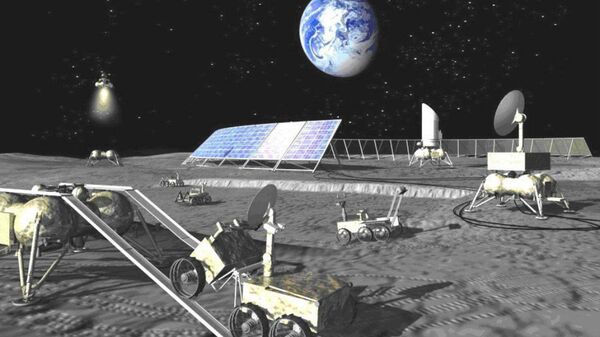According to Cruz, this document should be changed to accommodate the full-scale commercial exploitation of space, while at the same time continuing to fulfill its political function limiting the proliferation of weapons in outer space.
Commenting on the matter, Vladislav Shevchenko of the Sternberg Astronomical Institute at Moscow State University recalled that "the elaboration of space law was originally associated with the development of the Moon, the construction of habitable bases there and the extraction of minerals."
Ted Cruz wants to modernize the #OuterSpaceTreaty to facilitate #space #business & #entrepreneurship. https://t.co/YDLiHCjxHH
— Satellite Squared (@CZ_Sat2) 23 мая 2017 г.
"Under the 1967 Outer Space Treaty, any cosmic body, including the Moon, cannot belong to any state or country; it remains common human property," Schevchenko said.
He added that he always wondered why his American colleagues at the Johnson Space Center in Houston refused to bother creating a moon base, given the great technical success of the US in single manned flights to the Moon.
He said that for him, it was also unclear why Americans refuse to begin work developing lunar resources.
"They answered by asking me to imagine the situation when they deliver to the Earth commercially significant quantities of valuable metals. Shortly after, representatives of a certain small state, which did not take part in the industrial development of the Moon but signed the 1967 Outer Space Treaty, emerge and start to require their share on totally legitimate grounds," Shevchenko said.
TIL: There are laws about space for a reason. "In 2000, Gregory Nemitz registered a claim for the asteroid Eros…. http://t.co/aeIqwv4fZ7
— Hamid Fathi (@thehamidfathi) 13 мая 2015 г.
In this regard, he referred to an interesting case in the late 1990s when US entrepreneur Gregory Nemitz decided to claim ownership of an asteroid, given the fact that the 1967 Outer Space Treaty includes a ban on the sole ownership of space objects by countries, nations and people rather than by individuals.
"Nemitz said to me that he wanted to create a legal precedent and open the road to space for private capital for the common good. Shortly after, entrepreneurs of a different kind tried to capitalize on this loophole in the 1967 Outer Space Treaty," Shevchenko said, referring to "the firms that deal with selling plots on the Moon."
He said that during the ceremony, he showed the employees their future lunar plots and briefed them on the cost of cobalt, nickel and other valuable metals to be extracted from their moon lands.
"They were happy, and I advised them to start saving considerable amounts of money already," Shevchenko added.
"They believed that they would need the money to transport their wealth from the moon. But I had to upset potentially lucky people and bring them back to harsh reality. I said that the money that they would have saved would have to be spent on lawyers so that they could prove these employees' legal rights to their lunar property," he concluded.



